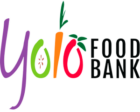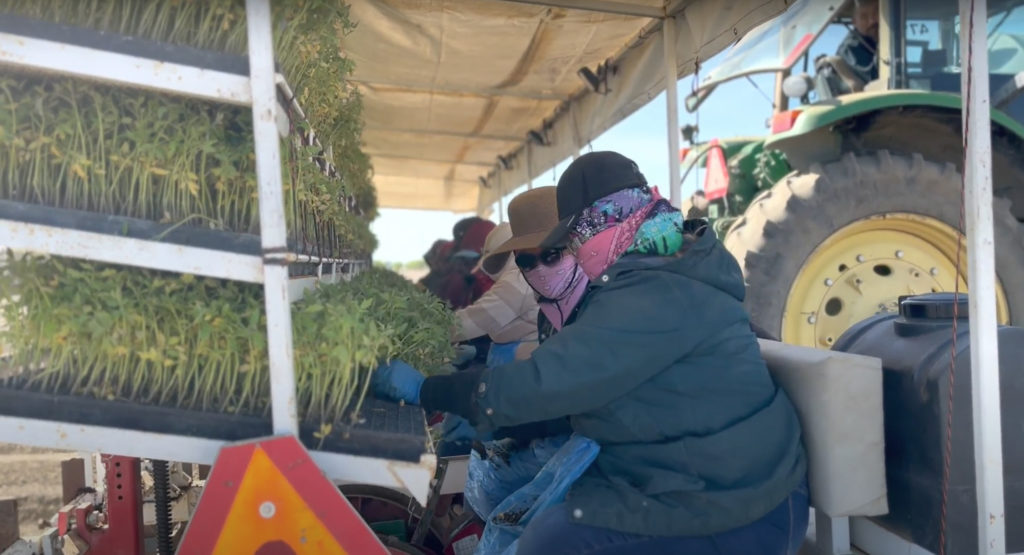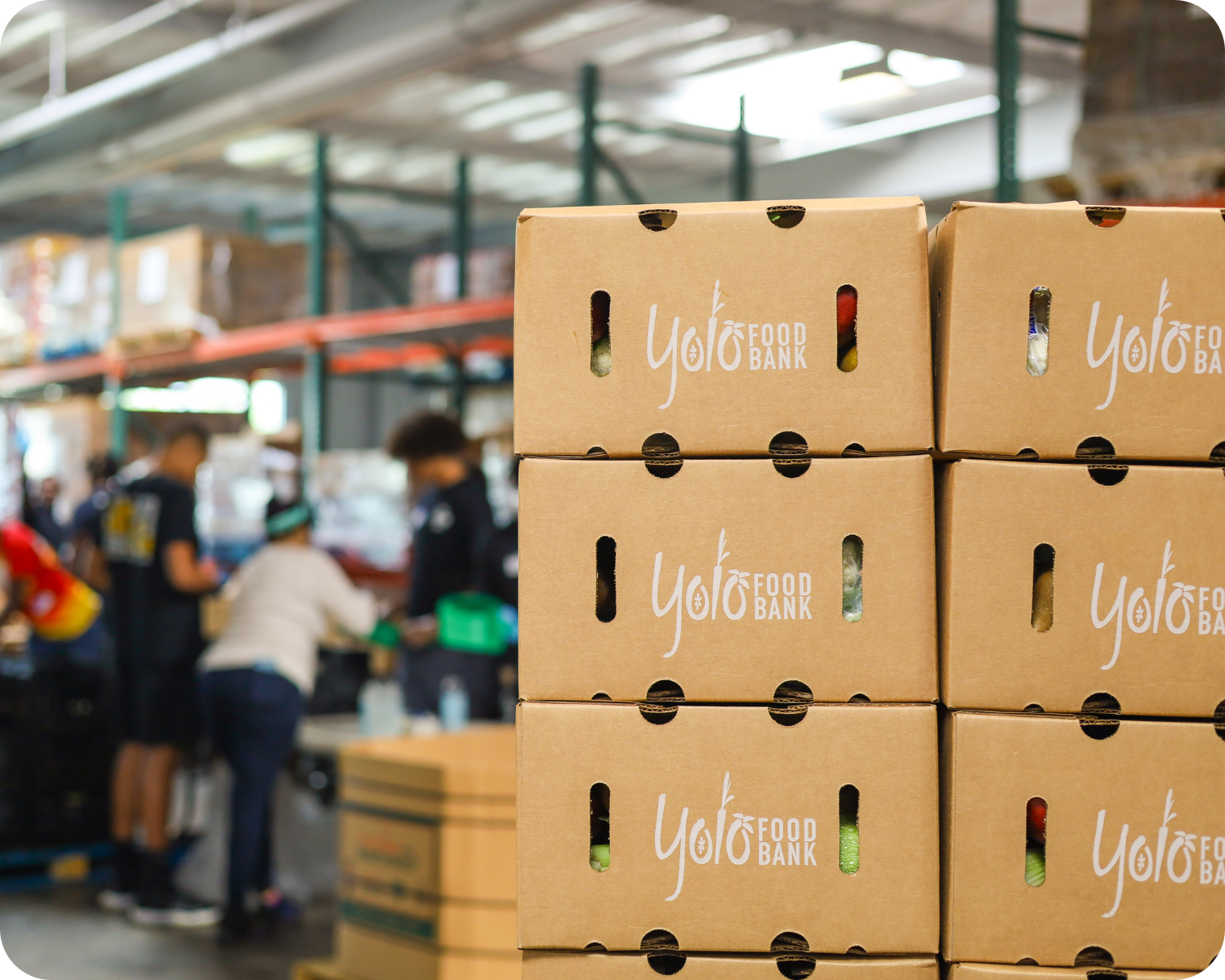What is America’s Farm-to-Fork Capital without the people who harvest, process, transport, prepare, and serve our food? Food system workers were designated “essential” by the federal and state government at the onset of the pandemic, yet they’ve been our most essential workers all along, deserving of an equitable food system representative of their needs.
“Flipping the Food System: Nourishing the Workers Who Nourish Us” is a Yolo Food Bank initiative focused upon uncovering the needs of food system workers in Yolo County. These workers and their families face disproportionate rates of food insecurity. Working through wildfires, heat waves, exposure to pesticides, pandemic outbreaks and disruptions, these communities have been hit hardest during COVID-19, many living in crowded spaces with multiple families heightening their exposure to the virus.
“The most essential workers are the agricultural workers, food processors and distributors, and the people who harvest our food – they bear the brunt of an unjust food system,” affirmed Yolo Food Bank Executive Director Michael Bisch. “Regarded as essential but treated as disposable, we all rely on these vulnerable populations to meet our basic needs for sustenance, yet this poses a paradox as many of these food system workers cannot count on a secure livelihood for themselves or their families.”
As inflation peaks, the most vulnerable members of our society are being left further and further behind. According to a 2021 study from the Public Policy Institute of California, nearly 21% of Yolo County residents are living in poverty in Yolo County – the highest poverty ranking among California counties. And in 2016 California Institute for Rural Studies found that food insecurity among farm workers in Yolo County was almost three times the national average. Today, food insecurity amongst that population presumably has not improved. Rising housing costs, a lack of access to basic healthcare and government programs, childcare challenges, and more compound to form a large web of interconnected and systemic inequities that exacerbate pre-existing disparities for our neighbors in need.
The inequities that these vulnerable populations face place these individuals on the margins of society, in a state that nourishes the entire nation. California is the top agricultural producer in the country, and our food supply chain relies on a healthy and sustainable workforce. In Yolo County a large proportion of crops grown are specialty crops and organic produce, both requiring high labor inputs. In addition to labor challenges, local farmers in the region don’t have it easy. The drought paired with high costs for fuel and supplies have placed increasing pressure on the local agricultural economy.
Despite complex challenges taxing the agricultural community – local farmers and ranchers – celebrate their essential workforce and prize the labor that enables them to nourish customers and residents in need. The farm community is generous; many local farmers give back to their community by donating crops to Yolo Food Bank every year.
“At River Garden Farms we believe in three things religiously: the land, the water, and the people,” expressed River Garden Farms General Manager Roger Cornwell. “We support new initiatives such as ‘Flipping the Food System’ from Yolo Food Bank that benefit the entire local food system. With a strong commitment to the community and the environment in mind, we do our part by donating a variety of crops such as squash, melons, and sweet corn to struggling families through Yolo Food Bank’s food distributions.”
“A successful local agricultural system with vibrant communities begins with nourished individuals,” stated Best Ranch Owner Dan Best. “Best Ranch provides pumpkins and squash to Yolo Food Bank every year – they connect us and other farmers to the communities that need us the most. The ‘Flipping the Food System’ initiative will fortify the food supply chain by ensuring we take a closer look at our essential workforce and local farm economy.”
“The soil and the people are of utmost importance here at Tule Farm,” said Tule Farm Owner Fritz Durst. If we take care of our land and people, they will take care of us. That’s why we support this initiative and it’s why we donate thousands of pounds of rice to Yolo Food Bank for countywide food distributions every year – it’s a win-win for us and for the greater community.”
Farmers who are unable to donate crops, give back by donating funds and time to Yolo Food Bank. Creating a sustainable local food system is possible when we all come together and tackle the challenges at hand. And creating an equitable supply of food for our local families is also possible when we ensure no one is being left behind.
“We produce tomatoes and tree crops in Yolo County for consumption. It all begins with our people – we would not be able to produce quality products without a quality workforce,” said Bullseye Farms Owner Tim Beeman. “We believe in healthy communities and I couldn’t think of a better partner than Yolo Food Bank to take care of our community in need.”
“My employees are an integral part of the agricultural community in Yolo County,” stated Yolo Food Bank Board Chair and Muller Ag Owner Tom Muller. “From planting to cultivating to harvesting tomatoes, peppers, amongst other nutritious crops, their work is part of a food system that starts on the farm and ends on kitchen tables. As a farmer who works with the earth to grow the crops that nourish people, I am proud to support the Food Bank’s necessary work — they are the best place to go when you need assistance.”
As a society we must acknowledge our collective dependence on a healthy farm economy. Along with food system workers, farmers and ranchers in the region have their own challenges – they are hard-pressed battling a plethora of agricultural setbacks and receiving little margins on the crops they produce that feed an entire nation. It becomes everyone’s problem when challenges in our fields result in challenges in our homes.
An effort to discuss the essential perspectives and provide actionable inspiration was made on October 2021 during Yolo Food Bank’s inaugural “Food for Fairness Summit.” Yolo Food Bank convened more than 60 thought leaders from diverse backgrounds for a three-day summit – environmental activists, farmers, food and agricultural representatives, community organizers, business leaders, civic and government leaders, healthcare and nonprofit professionals, professors and scholars, and more – to consider what an equitable and sustainable food system would look like locally and globally. A resounding conclusion amongst many participants and panelists focused the community’s attention on food system labor in our region.
Results from the summit, paired with foundational research conducted at our food distributions by Yolo Food Bank Impact and Innovation Officer Robb Davis have informed this new focus for the Food Bank. Through community-based participatory learning, our approach includes community listening sessions, building authentic and local partnerships, mapping the community’s strengths and assets, and centering and amplifying the voices of the agricultural community.
It’s time to shine a light on the individuals who have made the Greater Sacramento Region an agricultural superpower and America’s Farm-to-Fork Capital. And it’s time to learn from, co-create with, and cook up a food system that is of, by, and for all.




